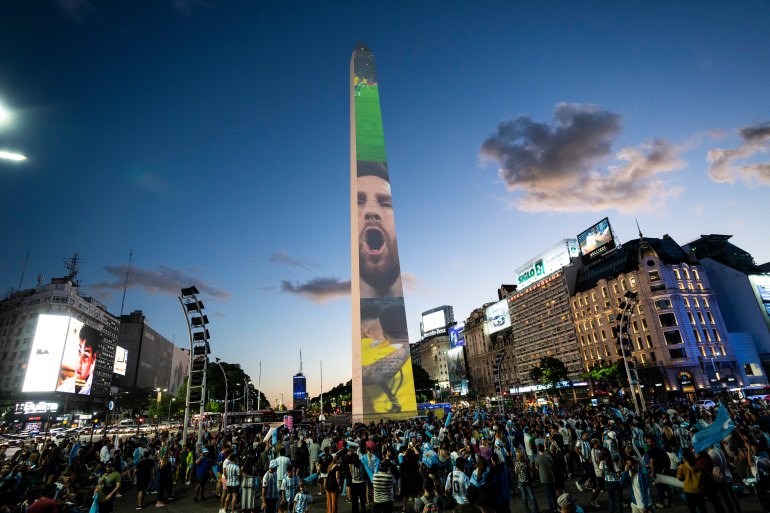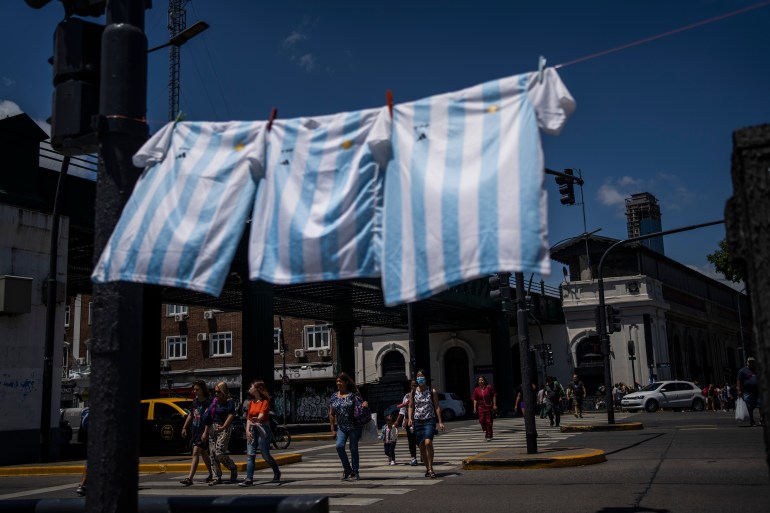‘We’re going to win’: Argentina waits in hope for World Cup title
A nation battered by crises is coming together to cheer for Argentina as they face France in Sunday’s World Cup final.

Buenos Aires, Argentina – A day before kickoff for the World Cup final in Qatar, Mayerlin Díaz Iglesias and her eight-year-old son Jose Alberto took a selfie in the heart of Buenos Aires.
Decked out in Lionel Messi jerseys on Saturday afternoon, they were standing before the soaring Obelisco de Buenos Aires, a monument that – since it was erected in 1936 – has stood as a national symbol of Argentina’s greatest successes.
Keep reading
list of 4 itemsArgentina’s Messi confirms Qatar final his last World Cup: Media
How Muchachos became Argentina’s unofficial World Cup anthem
Argentina fans protest lack of tickets for World Cup final
In this football-obsessed nation, that has often meant the country’s wins on the pitch. If the Albiceleste end up beating France in the World Cup final in Qatar on Sunday, tens of thousands of Argentines will flood the Avenida 9 de Julio – where the monument sits – as is the tradition, dancing to bongos, car horns and anthems they have been belting out for weeks.
“We’re here because Argentina is going to win,” said a confident Iglesias, 46, holding her infant daughter, also dressed in Messi gear. “We know that it’s going to be a huge party.”
Argentina has been vibrating with this kind of energy ever since it beat Croatia in the semifinal last week and earned a berth in the final at Lusail Stadium against Les Bleus, as the French side are known.
Few places on earth are as fixated on football as this country of 47 million people. The sport is part of its cultural identity: It’s a calling card around the globe; a way to measure greatness in the midst of chronic economic crisis; a fountain of joy and talent.
Jose Alberto, Iglesias’ son who is only two World Cups old himself, already knows how much the tournament means. One World Cup ends and the countdown to the next one begins, he said, standing in front of the obelisk.
Argentinian fans have had high expectations for the team led by superstar Messi, himself chasing the one trophy that has eluded him throughout his illustrious career. After a shocking opening loss to Saudi Arabia, the maestro went back to conducting a symphony on the pitch. And with every victory, every step closer to the goal, the crowd at home revelled in the splendour they saw on television – and for those who went to Qatar, in the flesh.
Now, hours away from the final match, the excitement and tension are at a fever pitch.
“Maradona, Maradona, Maradona sells,” said a merchant on Corrientes Avenue, the city’s theatre district, hawking jerseys that seem to be in endless supply. “If you’re younger, you look for Messi,” she added, or Julian Alvarez, the 22-year-old striker who emerged as a star during the tournament with four goals so far.

“That passion, that communion, that thing of celebrating the goal with the person that you have beside you, even though you don’t know who they are, or what they think, or where they come from,” said Buenos Aires Mayor Horacio Rodriguez Larreta. “We’re all together behind the same passion.”
A grandmother who joined in raucous celebrations in a suburb of Buenos Aires has become an online celebrity, dubbed “Abuela lalalala”; while a still from video of Messi calling a Dutch player “fool” after the tense quarterfinal against the Netherlands soon graced t-shirts sold at street corners.
On the streets, the enthusiasm is infectious, with people singing Muchachos, Ahora Nos Volvimos a Ilusionar (Guys, we’re excited again) a catchy song by La Mosca Tsé that has become the de facto Argentina World Cup anthem.
The city of Buenos Aires organised “banderazos” – events for people to cheer on the team, dance and wave their Argentina flags – at 15 points across the capital in the days before the final. The idea? Players more than 13,300km (8264 miles) away in Qatar should be able to hear the collective “scream” of the fans backing them.
The passion has also shows in superstitious rituals known as cabalas, in which people repeat a set of game-viewing behaviours that they’ve come to associate with victories. Fans have been watching games with the same people, sitting in the same seats, wearing the same clothes, and eating the same food – all meant to increase the chances of victory.
The World Cup has even summoned the sorcery of self-described witches in Argentina, who have banded together to use candles, orations and other rituals to send positive vibes in the direction of the team. They have also warned against practices that are meant to interfere with the French players, saying those could backfire on Argentina.

“It’s incredible to see what Argentina generates during the World Cup,” said Miguel Angel Bogado Gomez, who was selling World Cup souvenirs next to the obelisk. “Even Brazil, which has an incredibly high level of football, doesn’t end up doing what Argentina can on an international level with a ball and its jersey.” Even that hyperbole – Brazil have won five world Cups to Argentina’s two – only underscores the near-mythical status Argentina’s football players enjoy.
The 56-year-old craftsman, who sells his woodburning art, had a selection of Maradona- and Messi-themed art pieces. At his age, Gomez said, he has come to understand that “not everything turns out the way you want” but he’s so invested in this World Cup that the thought of having victory slip out of the team’s grasp filled him with anxiety. “At this time tomorrow, we could be champions,” he said.
Iglesias and Jose Alberto are convinced too. She described the World Cup as a “joyful” month that “brings unity” that she has seen through the messages she exchanged with friends and family in other parts of Latin America, particularly Venezuela, where she is originally from. Support for the Argentina squad has spread across the region, with people in Chile, Colombia, and even Brazil – a football rival – pulling for the team that’s representing South America in the final.
“I’ve carried Argentina in my blood for a long time, since I was young in Venezuela, and my dream of coming to live here came true,” she said. “The faith I’ve had with football, I’ve always had with Messi.”
For Elias Draganczuk, 38, the World Cup has been a distraction for a country ravaged by high inflation and seemingly endless economic gloom. “This is the opium of the village,” he said, looking out from a shaded perch near the obelisk. “Every four years to spend millions and millions on this when this is a country that doesn’t have potable water [in some parts],” he said, shaking his head.
Even though he hasn’t surrendered to football fever, he knows where his allegiance lies. “I’m Argentinian,” he said with a laugh. “Obviously I want them to win.”
